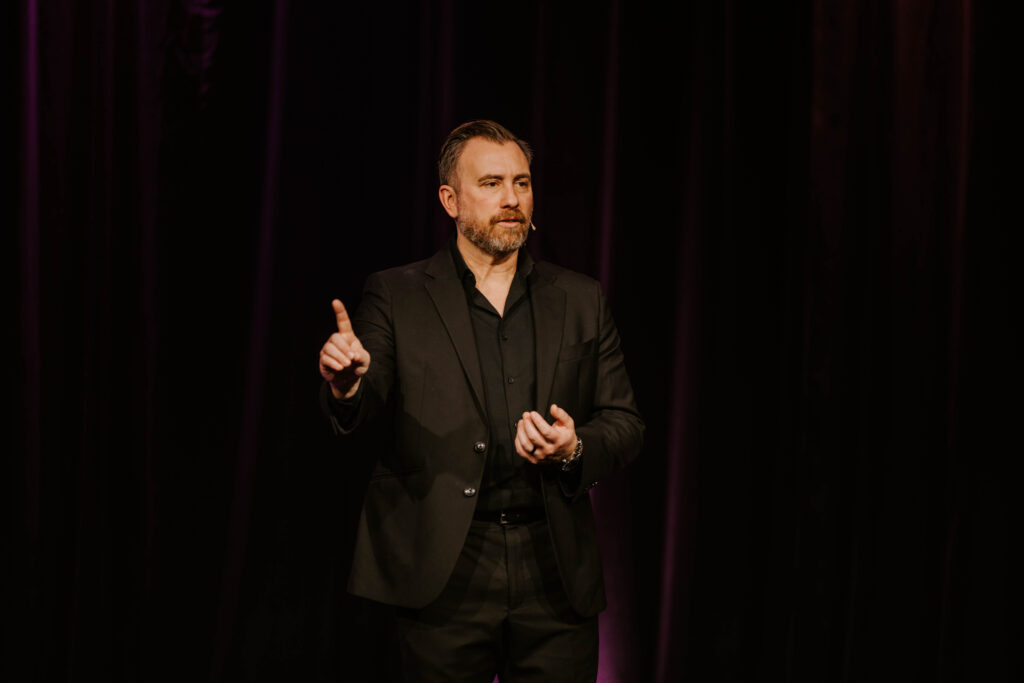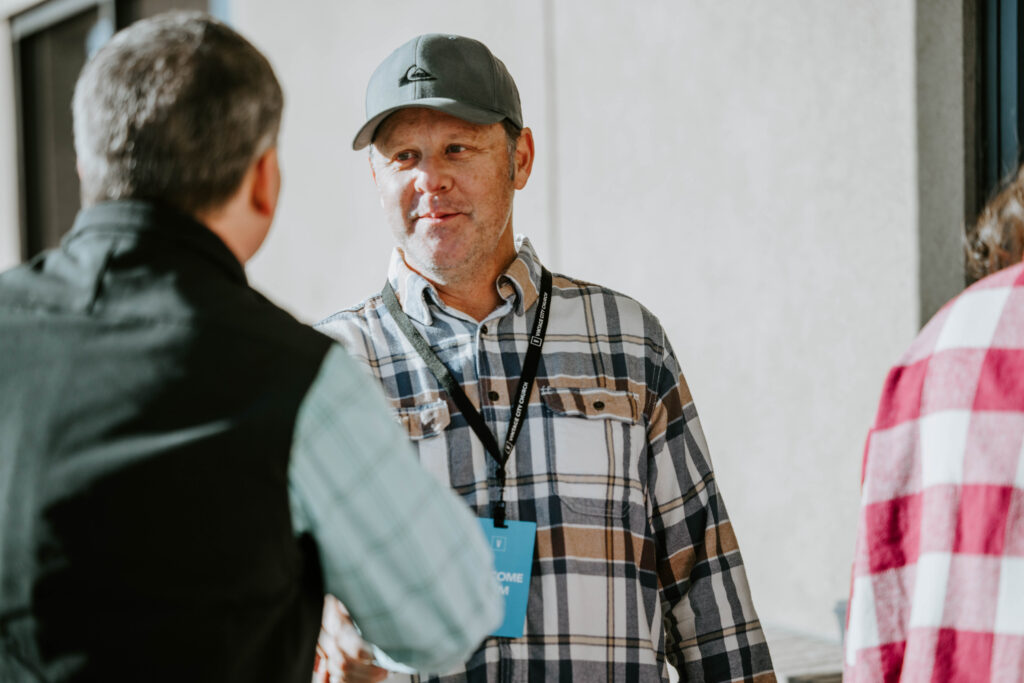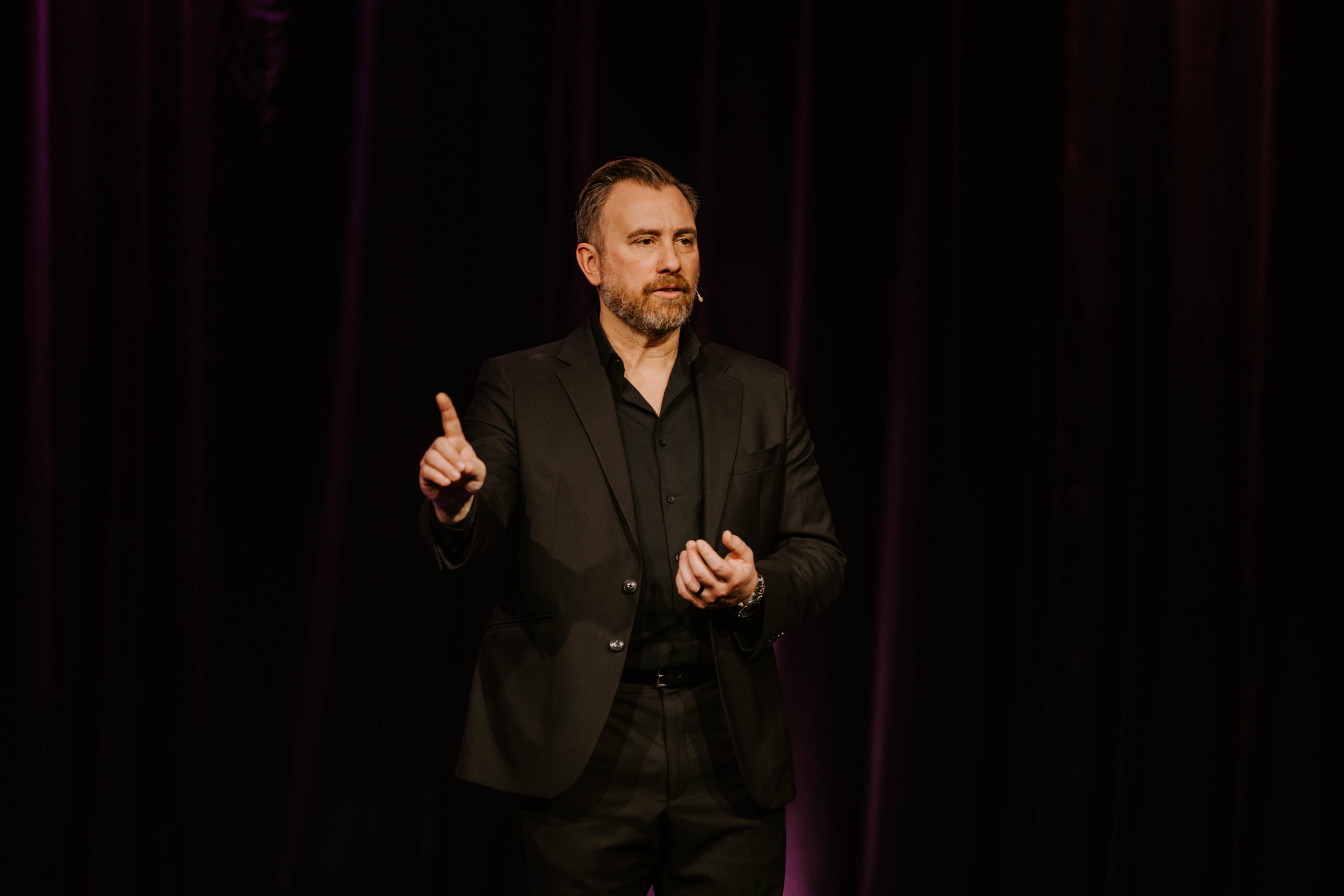You see, acting important reveals a terrifying truth: you don’t actually think you are, and you haven’t heard His voice enough to refute that fear.
March 2, 2023





Passage: Romans 12:15-21
Speaker: Greg Sanders
Diving Back Into Romans 12
If you have your Bibles, I’d love to invite you to open those to Romans chapter 12.
I want to work back into Romans 12 with the time we have left in this gathering. We didn’t really get to finish chapter 12, and then David Mitchell and Pastor Gary took us through 13. And I wanted to come back and finish this because I think what’s in 12 is so vital for the rest of where Paul’s going.
And as Pastor Gary said last week, I don’t think you can teach 13 without a healthy understanding of 12. And I think Paul begins in verse nine of chapter 12, it’s really kind of where we’ve jumped off of since early December, where he says, “Don’t just pretend that you love others.”
Don’t Just Pretend That You Love Others
I don’t know about you, but for the last three months, that has been a really challenging idea for me. To find the places in my life where I am pretending. The word that he uses here is “to feign” or “to act.”
How many of you would say with me, “I’ve been seeing lots of places where I pretend. I act like I love people.” Really, you’re all doing that awesome at this? Good for you.
His challenge is just this authentic love, a refusal to be part of what causes pain in others. Paul’s building from that, and I want to pick us up — in this gathering, we started, and we worked through verse 15, “When others are happy, be happy with them. If they’re sad, show their sorrow.” And we just talked about making the choice to really engage with others instead of just going through life and ignoring them.
It’s just so interesting that Paul doesn’t say, “If you’re feeling extra compassionate, go ahead and give them a bit of your time.” He talks about others, and I love this word and hate it. Because it’s a big word that doesn’t give me a lot of latitude to ignore the world around me.
Engaging The World With A Kingdom Agenda
It’s a word that causes me to engage the world around me and assume that in every situation I’m in, it’s with a kingdom agenda. That no matter where you and I go — whether it’s on the job, whether it’s on the airplane, whether it’s in King Soopers — that our assumption is to be based on what Paul teaches: that everywhere we go, we have been given kingdom orders, and we are to live out a kingdom mandate. And he says in the midst of that, when you’re around people, engage them, join in their happiness, join in their sorrow.
Which is a deep challenge because it’s much easier to ignore them. How many would agree that it’s a lot easier to ignore people? It’s a lot easier to, in your head, be like, “You got problems,” and just let it go.
But Paul says that’s not what we’re to be. It’s not what we’re to do.
He talks about living in harmony. We looked at this and the word means “sameness.” And it doesn’t mean to be identical. It’s literally the idea of a puzzle piece fitting together. He’s talking about learning how to mentally position and orient your mind so that you’re finding ways to connect with other people.
You’re not living in the condition where you’re saying, “If you can figure out how to connect with me, great. If not, I don’t need you.”
It’s actually a deeply challenging idea that Paul teaches here — to live in harmony with each other. Put it upon yourself to live at peace and to be in harmony with others. Don’t wait for them to find harmony with you.
How many married folks love that one? Because isn’t it easy in those moments where you’re like, “My spouse is being stupid, and I’m just going to let him be stupid.”
And Paul’s statement is no, I want you to find a way to bridge that gap and connect. Take it upon yourself to be the harmony creator, to be the peacemaker. When it feels so much more native to us to stand our ground and be like, “I have boundaries.” But Paul’s statement here is “Own your responsibility to live at peace, to be in harmony.”
Leaving Behind Our Sin Nature
So I want to pick us up with his next idea, which says, “Don’t try to act important but enjoy the company of ordinary people. And don’t think you know it all.”
I think Paul targets a reality that is hardwired into both the human psyche and into our sin nature. We’re going to see this all the way through through 12. He keeps going back and forth with these Kingdom ideas that are incredibly counter to how we’re wired in our sin nature.
How many would agree with me, at least in this gathering, that I’m not supposed to live out of my sin nature? Can we start there with an agreed upon baseline that we are all supposed to leave our sin nature behind? Now, how many would also agree with me that I don’t do that very often, that I find my sin nature is at war with this kingdom nature?
See, isn’t that what Galatians teaches? You’re never going to have a decision in life where those two things aren’t at war. The responsibility of the believer is to put Jesus on and allow his perspective and kingdom to trump their nature.
So if you’ve ever said, “It’s just who I am. It’s just how I’m wired.” All you’ve done is said, “I gave into sin.”
I would go one step further and tell you I don’t think Jesus cares what your nature is because He gave you His. His statement was, I assume all of your natures are broken. So I’m going to give you mine. Put on my image, let go of yours. Your native image will fail you. His image will not.
The Desire To Act Important
So what Paul’s targeting here is this desire to be important, and it’s something I think we all deal with whether we’re going to admit it or not. The root phrase here for “act important” means “to measure.”
So for Paul, this tendency towards measuring is the source of the problem. What does that mean? What is measuring? The need to measure oneself against something outside of us is the appropriation of an improper external imprint for finding our value.
That’s a big phrase. Let me say it again. The need to measure oneself against something outside of us is the appropriation of an improper external imprint for finding our value.
Because our external imprint for value is to be the man, Jesus Christ. It is not to be another person. It is not to be another system. And what Paul’s calling out in this verse is an attempt to get close to people we view as important in order to make ourselves feel important.
How many have ever done that? How many are too scared to admit it in this room? Paul’s challenge is really simple: stop it. And develop an encounter with the King so He can imprint on you.
Think about all the places in life where you have put someone into a position where if they see you, if they talk to you, if they respond to your text messages, whatever it is, you feel value. While that might feel normal, it’s dangerous.
The safer and healthier place to land is to find your value with the King and live from that place of value towards others. In this way, what we say to others isn’t “I don’t need you.” What we say to them is — let me free up humanity and say — “You’re not defining my value, He is. I’m here to serve you. I’m here to love you. I’m here to pour out on you.”
Enjoy The Company Of Ordinary People
And so all of a sudden, it deals with this weird insecurity that we have where we’re kind of trying to grab onto people in hopes that they make us feel important. And Paul goes on and adds one more thing to it. Don’t just refrain from trying to be important, but choose to enjoy the company of those who already feel low, or are a bit downcast. He says don’t try to act important, but enjoy the company of ordinary people.
It’s interesting, ordinary people. The word here means to be downcast or to be impoverished. He literally gives a tutorial of how we are to walk through life. Don’t look for people to define your value, look for people that you can give value to. Find the people that you can see by their condition that they need somebody to pick them up. Give your time to those people. Give your energy to those people.
You see, when we step into this discipline, we step into encouragement and become lifters.
And this discipline is a kingdom movement that seems to follow the same pattern in Romans. It breaks us out of our sin tendency, which is to measure ourselves by those we deem important. I actually think it’s more than an opposite movement. I think it’s the antidote to this epidemic of finding our value by somebody important giving us attention.
And the only way we do it is we go back to this discipline of sameness that we talked about. And we’re actually working to find connection and commonality with others. What Paul’s simply stating here is, Church, choose to let your insecurities go.
When you find yourself leaning into someone else for value, call it out for what it is. “Hey, Lord, that’s my insecurity speaking. Will You please forgive me? I clearly am not getting my value from You.” And go back to that secret place and say, “Jesus, here I am. I need You to pour value into me. I need to hear Your voice. I need to hear who You say I am. I need to know how You see me.”
If you’re like, “I don’t know how to hear God.” Again, a problem. “My sheep hear My voice.” It’s not an if statement. It’s a promise statement. He doesn’t have any children that are illegitimate. He’s not the respecter of persons that will speak to one and not another.
Well, then why can’t I hear him? Because you’re blocked up. You might be blocked up because you have father issues, you have mother issues, you have leader issues. You might be blocked up from sin patterns. That’s the whole purpose of learning to get healthy. That’s the whole purpose of leaning into therapy and counselors and people in the church that can walk through things with you. It’s this aggressive pursuit of health to the King. If I can’t hear His voice, it should be a red light blinking. I’ve got a problem, and I’ve got to fix this because His voice is my right.
You see, acting important reveals a terrifying truth: you don’t actually think you are, and you haven’t heard His voice enough to refute that fear.
I don’t know about you, but I feel like multiple times a day, I have this thought process of “I’m a failure. I haven’t really gotten where I want to go in life. I haven’t achieved enough.”
Letting Go Of Brokenness
I remember, David Mitchell and I were having a conversation four or five years ago. And I will butcher the quote, but what he said impacted me so deeply because he talked about one of the first principles of getting healthy is acknowledging the brokenness that got you to where you’re at. And it served you well, but it’s time to let it go.
I would suggest that we put a line in the sand and say, that internal monologue that is ripping apart the fiber of who we are, it’s time to lay it down. Even if you’re like me, and you used it to get here. You let it drive you to become more aggressive and more focused. Because it’s contrary to what He says. And it means we’re partnering with a lie.
Part of letting our insecurities go is controlling what is feeding our belief. If the inner voice is feeding what you believe about yourself instead of the King’s voice, you got problems. You’re inviting insecurity to drive you. You’re inviting insecurity to lead you. Church, I don’t think insecurity is a very good master. I don’t see a single place in the Scriptures where it says, find your insecurities and let them lead you forward.
What I see is a lot of places in Scripture that seem to repeat and repeat and repeat and repeat this idea of hearing His voice and being led by Him.
Because this whole thing Paul’s dealing with is rooted in insecurity that assumes you need to be more to be valuable. You don’t need to be more to be valuable. You just need to be who He’s made you to be. You are valuable to Him because you are His.
“For God so loved the world.” “Anthropos” is the word in the Greek. Each individual piece of humanity, He was so in love with it, He gave his Son. If that doesn’t define value, I don’t know what does.
Living Honorably
Paul goes on to say, “Never pay back evil to anyone. Do things in such a way that everyone can see you are honorable. Do your part to live in peace with everyone as much as possible. Dear friends, never avenge yourself.” Say that with me. Never avenge yourself. What does never mean? Never. “Leave that to God. For it is written, I will take vengeance, I will repay those who deserve it. Says the Lord. Instead, do what the Scriptures say. If your enemies are hungry, feed them. If they are thirsty, give them something to drink. And they will be ashamed of what they’ve done to you.”
So Paul cuts into a really difficult challenge. How many are hardwired to have a very quick retaliation response? How many are lying right now? How many would admit you’re a little hot-headed? Quick-tempered? Passionate? Whatever word you want to put to it, how many would admit yeah, there’s a quick trigger instinct in me?
You see, Paul’s statement here is, “I’m going to challenge something. I’m going to teach you something instead of retaliating when wrong happens to you. I want to teach you to absorb sin. I’m going to invite you to walk into the world and be a sponge for all the wrong that happens.” That’s a dumb idea. But it’s what he says here.
Refuse To Retaliate
Never pay back evil for evil to anyone. There is never a time in your and my life where the retaliation for wrong done to us is okay. Paul says never repay evil for evil to anyone. Do things in such a way that everyone can see you’re honorable. Do your part to live at peace. Never avenge yourself. Leave that to God. Just think about this language.
He’s calling us to live, allow evil and difficulty to happen to us, and refuse to retaliate. And by doing that, we defuse the situation and we undermine the agenda of evil because it doesn’t get a reaction.
Have you ever noticed how hard it is to have an argument with somebody if you refuse to say anything? Do you ever notice how quickly things escalate when you won’t shut up? Do you ever notice when you retaliate it doesn’t ever get better?
Paul’s statement here: refuse to pay back evil for evil. Never. It’s so beyond contrary to our DNA. Again, same principle we’re seeing. It’s Paul presenting a kingdom response for a sin pattern.
Become A Sponge For Sin
I have a question: what would happen if we learned to take all the evil that happened to us in a given day to Him? We just absorb it all during the day. We go sit with Him at night. You sit with Him in the afternoon whenever — you’re like, “I can’t hold this, I’ve got to take this to Him.”
We just go before Him and say, “Here, I absorbed this from around me today and I’m just gonna give it to you to deal with.” Because what Paul says here is that the grace has been given to us to absorb ut but not to deal with it. The authority has been given to us to absorb it but not to deal with it.
In fact, Paul says here, I want you to refuse to deal with it and let Him. And if we would do that, by that simple act, we would thereby be functioning as sin sponges — think about this — scrubbing the environment, and then choosing to let it go and trusting Him to respond. And I think that’s what Paul says to do. Always choose to put honor on display. He says, “Let others see your honor, and trust Him with paying it back.”
I believe Paul’s actually teaching that when you and I refuse to handle difficulty and sin that’s being done to us, we make space for God to deal with it. Maybe we could say it this way. When we step in to handle it, we stifle the space that could be His and He steps away and says, “Okay, great. If you think you can do this better, I’ll leave it to you.”
Maybe consider with me for a moment that honor changes your environment. When you and I live and move and act in honor, we’re shaping the world around us. That’s what Paul’s calling for.
And when we walk in dishonor, we’re partnering with a sin system that is already functioning around us. Dishonor is our native state. Honor is a kingdom state.
Let me rephrase the retaliation question. How many of you, like me, tend to put your dishonor on display when you’re wronged? For sure, that is our native response. And Paul’s defining a life here where we absorb ugliness. Instead, add back to the world goodness, peace, honor. And the only way that works is if we trust the one who asked us to live that way.
Conquer Evil By Doing Good
Church, He promises that He will deal with it, that we don’t have to. I think David Mitchell said this in His teaching. A lot of us just don’t believe that. Or we know He’s kind and we don’t want Him to be kind. I always think about Jonah’s story. The reason Jonah didn’t want to go to Nineveh, He said, “I know how kind you are, they’ll repent and you’ll forgive them.” How many have ever wanted God to kick the teeth of somebody in so bad that you didn’t want them to get forgiven? You’re like, “I don’t want to pray for them. I don’t want to be kind to them. Because they know kindness leads to repentance and they’ll repent and you’ll forgive them and then I won’t get my do.” Again, our sin nature.
What is a sin absorber or sin sponge? It’s a person who’s decided to trust Jesus, to be good to the world around them, to be easy to live with, and to refuse to retaliate to sin and wrong. And then Paul finishes with a statement I think is so important. Don’t let evil get the best of you. But conquer evil by doing good.
Church, we have an enemy that would love to lure us and bait us into sin, into retaliation, into evil. He sets traps. Paul seems to be teaching that most of the enemy’s traps are relational.
A lot of us are good at avoiding the sin patterns that are obvious — things we’re not supposed to do. But very few of us are good at avoiding relational sin patterns.
And yet Paul’s teaching here 100% about relational sin. These things that others can do to us. The sin and the wrong. And according to Paul, we just have to choose to ignore the ploys of the enemy by staying close to the instruction of the King. And His instruction is to “Never pay back evil for evil to anyone. Let Me do it.”
One of the churches I worked in, there was a lady who used to use this phrase all the time “when you were dealing with somebody stupid.” And I remember, Pastor Gary used to say “stupid” a lot when you teach, and when my oldest son was young, he stood up one Sunday morning in the middle of the message and went “we don’t say stupid.”
It got about the same response in the room. But there was a gal who was a counselor. She was in our congregation and she used to always challenge: cut them off at the head. Now, initially, I’m like, “Yes.” But what she meant by that was get rid of the face, pay attention to what’s going on spiritually. Quit dealing with the person in front of you and start dealing in the spirit realm. What am I facing?
Because then you quit retaliating and you start laying down the stupid weapons and you pick up the right weapons. The weapons of our warfare are not carnal, but they’re mighty through the pulling down of strongholds. And the reality is, whether we believe it or not, the place we affect the most change in a person’s life is on our knees alone in the closet.
Learning how to intercede by absorbing their difficulty, their stupidity, the sin, the things they’ve done to us, we just absorb it and we take it back to the Lord and go, “Hey, I pulled this out of the world today, I’m laying it back before you, and by the way, for whoever it was, here, Lord, I just ask for your grace to be released upon them.”
Live As Our King Says
We live as our King says, and in doing that, we actively choose His kingdom over the enemy’s traps. You can only avoid the enemy’s traps if you’re going to live by the King’s guidelines. Alright, let’s stand.
Look at your neighbor and say, “This is gonna be a fun one to live out.”
But I want you to think about something different. What does the world look like around us if we live into this? What do our homes look like if we live into this? What does the marketplace look like if we live into this?
Jesus, we love you, we honor you. Lord, I can’t say I hate the Scriptures, but sometimes I hate what they say. Sometimes it just calls us to such a standard that feels like it doesn’t make any wiggle room for our nature. And while I know that that’s good for us, it’s just tough and Holy Spirit, we ask for grace as you teach us how to walk this out. We do need you and we do want to reflect you. May your face shine upon us this week. Be really quick to remind us of this stuff. Please teach us how to do it. We love you. We honor you. In Jesus’s name, amen.
Leave a Reply Cancel reply
the vintage weekly
News, updates, and events sent directly to your inbox every Thursday morning.
Stay up to date with what is going on at Vintage by subscribing to the Vintage Weekly - our weekly newsletter - and downloading the Church Center app. These resources enable us to keep you updated of upcoming events, opportunities, and alerts such as weather cancellations.
SUBSCRIBE TO VINTAGE WEEKLY
DOWNLOAD CHURCH CENTER APP
©2024 vintage city church All Rights Reserved
designed BY Amanda Doherty press, llc
back to top
get the news
Subscribe to the Newsletter
About
Statement of Faith
Our Team
Photo & Video Policy
Prayer Request
Capture Your Miracle
Find us
1501 Academy Court, #101
Fort Collins, CO 80524
970-779-7086
info@vintagecitychurch.com
Thank you for submitting your message. We will be in touch shortly.
